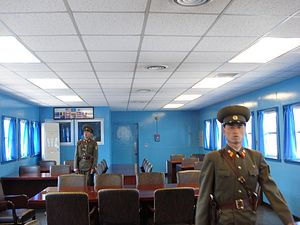North Korea may have reduced its number of political prisoners and closed one of its prison camps, South Korea’s state-run think tank revealed on June 17.
According to the report by the Korea Institute for National Unification (KINU), between 80,000 and 120,000 political prisoners are estimated to be detained in five North Korean political prisons.
The estimate is based on a series of interviews with North Korean defectors and analysis of satellite images of North Korea.
However, the report said the drop in the estimated number of political prisoners and prison camps does not reflect any improvement or changes in the North’s policies toward political prisoners.
“It is difficult to say that the reduction in the number and the size of prison camps was the result of any changes in the North Korean authorities’ stance or policy toward political prisons,” the report said.
The report went on to state that regardless of specific numbers, the important factor to remember is that the North Korean government still maintains the political prisoner camps, which reduce the level of hostility and threats the government faces from society.
In October 2009, the South Korean government said that North Korea maintained between 150,000 and 200,000 political prisoners in six political prisons while the National Human Rights Commission of Korea’s estimated in the same year that Pyongyang held around 200,000 political prisoners.
The report pointed out the closure of the political prison camp in Hoeryong and a high death rate caused by poor working and living conditions may have contributed to the reduction in the number of prisoners.
However, the figure produced by KIUN is contradictory to that of other reports by foreign organizations.
For example, the Washington-based U.S. Committee for Human Rights in North Korea (HRNK) said in its recent report, “North Korea’s Hidden Gulag: Interpreting Reports of Changes in the Prison Camps,” that two camps had been shut down in 2012, but that 130,000 individuals were still being held in penal labor colonies across the country.
Similarly, based on satellite images, the human rights group Amnesty International said in December of last year that there has been an expansion of existing prison camps in North Korea.
By analyzing the images, Amnesty International found new housing blocks, an expansion of production facilities, and continued tight security in a comprehensive assessments of camps 15 and 16 – known as kwanliso.
“The gruesome reality of North Korea’s continued investment in this vast network of repression has been exposed. We urge the authorities to immediately and unconditionally release all those prisoners of conscience held in political prison camps and close the camps immediately,” said Rajiv Narayan, Amnesty International’s East Asia Researcher.
The cruelty of North Korea’s prison camps has been considered as one of the most severe transgressions of the North Korean regime.
According to the KIUN report, most of North Korean prisoners are sent to the camps for trying to cross the border into China or for having family members who are suspected of being hostile towards the regime.
People in the camps are routinely beaten to death with wooden bats because the guards want to save bullets. Prisoners are forced to work all day, and only allocated one or two corn and rice balls for lunch. Consequently, most prisoners suffer from severe malnutrition and are not given proper medical treatment.
The estimated number of prison camps in North Korea varies depending on the reports, but the latest report by KIUN claims there may currently be five prison camps existing throughout North Korea.
North Korean prison camps have survived twice as long as Stalin’s Soviet gulags and much longer than the Nazi concentration camps.
































